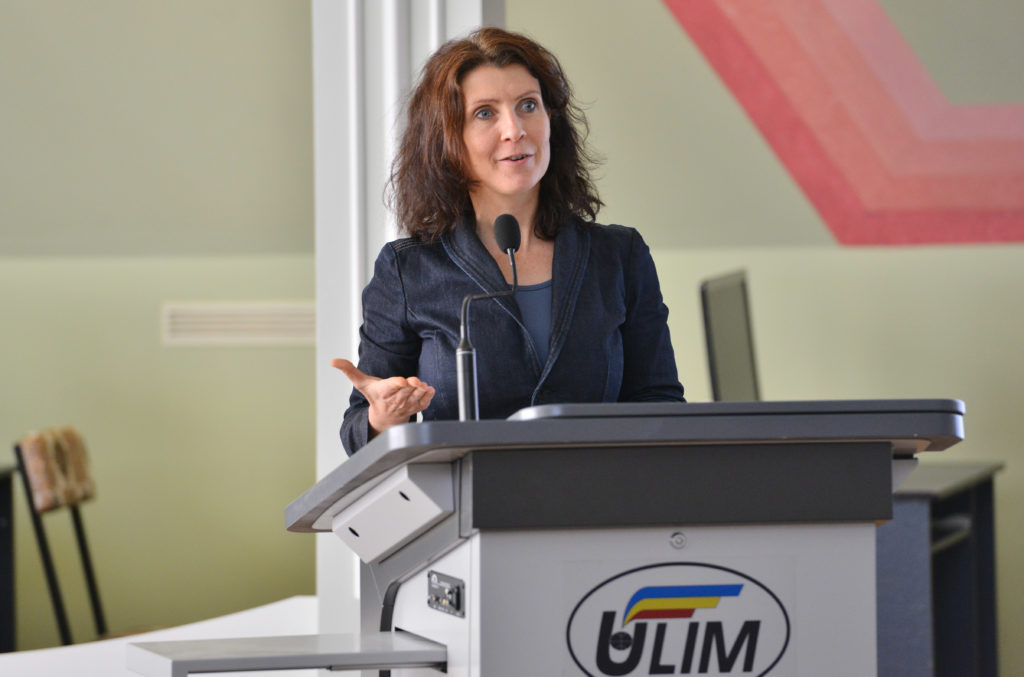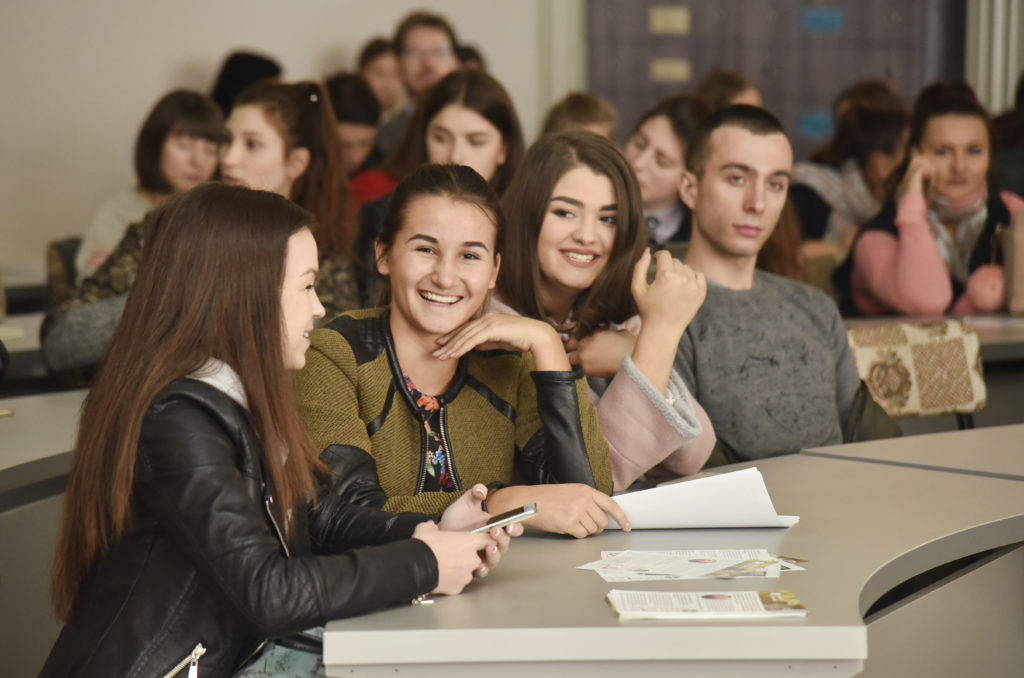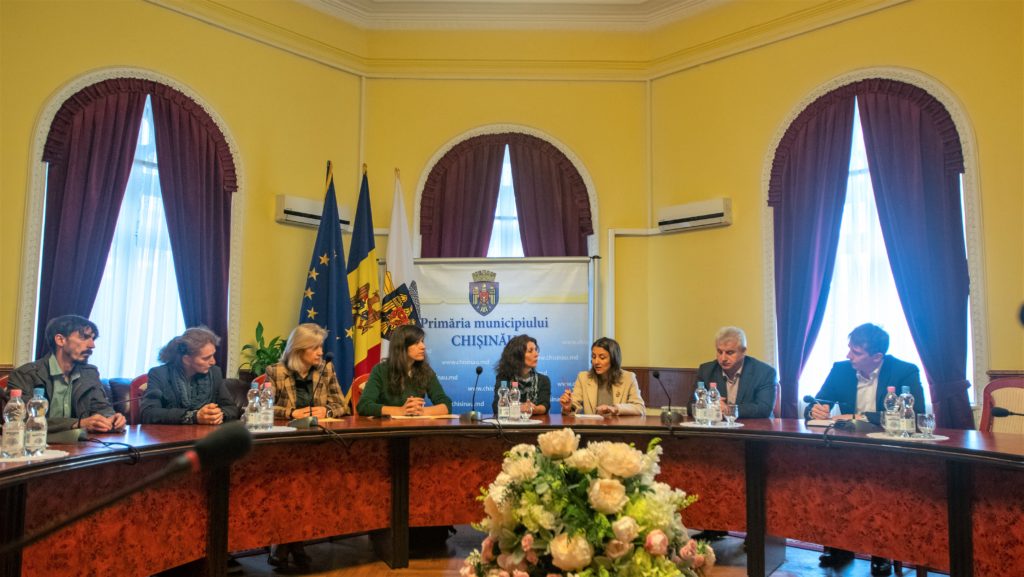Die lokale moldawische Regierung verspricht nach Besuch der niederländische Parlamentarierin Esther Ouwehand eine bessere Tierschutzpolitik für den lokalen Tierschutz
Last weekend – for the first time in Moldova’s history – a lecture was given on the importance of animal rights. Dutch MP for the Party for the Animals Esther Ouwehand held the lecture at a university in the capital Chișinău, in a packed lecture hall. After that, Ouwehand talked with local animal protectionists and experts in the field of organic arable farming. The council of Chișinău promised Ouwehand that a professional centre for sterilisation and vaccination of stray animals will soon be opened.

The lecture was held at the invitation of animal rights lawyer Ion Dron. During her lecture, Esther Ouwehand pictured how the efforts made for the welfare of animal also benefit people. She showed that society needs to be more connected with nature and that it should be led by compassion.
After the lecture, Ouwehand talked with several animal protectionists, who all pointed out the lack of regulations and legislation for the protection of animals in Moldova. Lawyer Dron wrote a legislative proposal in cooperation with a Moldovan NGO, which proposal is to legally enshrine the adequate protection of animals. Animal protectionists are now fighting together for adoption of this legislative proposal by the Moldovan Parliament.
Ouwehand was impressed by the many brave people in Moldova who dare to stand up for the interests of animals. And they do so quite successfully: animal protectionists’ protests helped to close down the dolphinarium of Chișinău . Also, a first step was taken against animal abuse by making cruelty against animals punishable in the Moldovan Penal Code.
Ouwehand: “Choosing the interests of the vulnerable instead of the right of the strongest can be done close to home too. The cruel treatment of (stray) animals is not acceptable in a civilised country. And we are so happy to see that here in Moldova brave people are standing up for the interests of animals and with that for the Moldovan people themselves. Wonderful!”

Agriculture
Ouwehand praised the fact that Moldova is doing relatively well within the region in the field of organic arable farming, where nutritious crops are grown, such as walnuts, fruit, beans and sunflower pits. However, she warned for the growing lobby of foreign companies to expand industrial livestock farming in Moldova. Now that the Western livestock industry is suffering a crisis and people in the West are less tolerant of the industry destroying their living environment, it sees opportunity to move its polluting practices to Eastern-Europe.
Ouwehand: “Moldova is well capable to provide food for the future: it has fertile soils and a great variety of crops, as a result of which a natural resistance against insects and plagues can be cultivated. Agriculture without overfertilisation and pesticides, with plenty of vegetable proteins for human consumption: that is what Europe needs. We hope that Moldova will not make the same mistake as the West did and will oppose to importing Western livestock practices, as this would mean a disaster for Moldova’s nature, animals, people and the environment.
Municipal policy

Moldovan animal protectionists told Ouwehand that local governments do very little to achieve animal welfare and that they even actively participate in the cruel approach of stray animals by facilitating so-called “Killing Stations”. That is why Ouwehand, together with animal protectionists, talked with the political advisor of the Mayor of Chișinău.
The council admitted that a lot can be improved in the area of animal welfare policy. The Mayor’s advisor then promised that the council will start to conduct an animal-friendly stray animals policy soon. The first step towards this is the opening of a professional centre for the sterilisation of stray dogs, where 50 dogs can be looked after and treated according to European standards. Ouwehand told the Mayor’s advisor that she will follow the progress through the local animal welfare organisations.
During the meeting with the council, animal rights lawyer Dron again emphasised why an appropriate animal welfare policy is essential: “Animal welfare is not only important for animals, but also for the entire society. An inadequate animal welfare policy will harm our society as a whole.”
Am vergangenen Wochenende wurde zum ersten Mal in der Geschichte Moldawiens ein Vortrag über die Bedeutung der Tierrechte gehalten. Esther Ouwehand, niederländische Abgeordnete für die Partei für die Tiere, hielt den Vortrag an einer Universität in Chişinău vor einem vollbesetzten Vortragssaal. Ouwehand sprach danach mit lokalen Tierschützern und Experten auf dem Gebiet der ökologischen Landwirtschaft. Von der Gemeinde Chişinău erhielt Ouwehand das Versprechen, dass bald ein professionelles Zentrum für Sterilisation und Impfung von streunenden Tieren eröffnet wird.

Der Vortrag fand auf Einladung des Tierrechtlers Ion Dron statt. Esther Ouwehand hat in ihrem Vortrag gezeigt, dass das Engagement für das Wohlergehen von Tieren auch eine Verpflichtung gegenüber den Menschen ist. Sie wies auf die Notwendigkeit einer Gesellschaft hin, die mehr mit der Natur verbunden und von Mitgefühl geprägt ist.
Nach dem Vortrag sprach Ouwehand mit verschiedenen Tierschützern, die auf einen Mangel an Gesetzen und Vorschriften zum Schutz von Tieren in Moldawien hinwiesen. Rechtsanwalt Dron hat in Zusammenarbeit mit einer moldauischen NGO einen Gesetzentwurf ausgearbeitet, der einen angemessenen Tierschutz in das Gesetz einbetten soll. Tierschützer kämpfen nun gemeinsam dafür, dass dieses Gesetz vom moldawischen Parlament verabschiedet wird.
Ouwehand war beeindruckt von den vielen mutigen Menschen in Moldawien, die es wagen, sich für die Interessen der Tiere einzusetzen. Und das tun sie erfolgreich: Dank Protesten von Tierschützern wurde das Delphinarium von Chişinău geschlossen. Der erste Schritt gegen Tierquälerei ist unternommen, indem die Grausamkeit gegen Tiere im Strafgesetzbuch unter Strafe gestellt wurde.
Ouwehand: „Sich einzusetzen für die Interessen der Verletzlichen anstelle für das Rechts des Stärkeren kann auch nah am Heimatort. Der grausame Umgang mit (streunenden) Tieren gehört nicht in ein zivilisiertes Land. Und wir freuen uns sehr, dass hier in Moldawien mutige Menschen für die Interessen der Tiere und damit für das moldawische Volk selbst eintreten. Großartig! “

Landwirtschaft
Ouwehand lobte die Tatsache, dass Moldawien in der Region relativ gut im Bereich des ökologischen Ackerbaus arbeitet, indem nahrhafte Kulturen wie Walnüsse, Obst, Bohnen und Sonnenblumenkerne angebaut werden. Sie warnte jedoch vor der wachsenden Lobby ausländischer Unternehmen, die industrielle Viehzucht in Moldawien ausbauen wollen. Jetzt, da die westliche Rinderindustrie in einer Krise steckt und die Menschen im Westen immer weniger tolerieren, dass die Industrie ihre Umwelt zerstört, sieht die Industrie Möglichkeiten, ihre umweltschädlichen Praktiken nach Osteuropa zu verlagern.
Ouwehand: „Moldawien besitzt alles für eine Ernährung der Zukunft: fruchtbare Böden und eine große Vielfalt an Nutzpflanzen, die eine natürliche Resistenz gegen Insekten und Schädlinge ermöglichen. Eine Landwirtschaft ohne Überdüngung und landwirtschaftliches Gift, mit vielen pflanzlichen Proteinen für den menschlichen Verzehr: Das braucht Europa. Wir hoffen, dass Moldawien nicht die gleichen Fehler begeht wie der Westen und sich gegen den Import von Rinderzuchtpraktiken aus dem Westen wendet, welche eine Katastrophe für die moldawische Natur, Umwelt, Mensch und Tier bedeuten würde. ”
Kommunalpolitik

Die moldauischen Tierschützer erklärten, dass die lokalen Regierungen wenig für das Wohlergehen der Tiere tun und sich sogar aktiv an einer grausamen Herangehensweise an streunende Tiere beteiligen, indem sie unter anderem so genannte „Tötungsstationen“ ermöglichen. Deshalb sprach Ouwehand zusammen mit den Tierschützern mit dem politischen Berater des Bürgermeisters von Chişinău.
Die Gemeinde erkennt an, dass es im Bereich der Tierschutzpolitik noch viel zu verbessern gibt. Dann versprach der Berater des Bürgermeisters, dass die Gemeinde baldigst eine tierfreundlichere Streunertierpolitik einführen werde. Der erste Schritt dahin ist die Eröffnung eines professionellen Zentrums für die Sterilisation von streunenden Hunden, in dem 50 Hunde aufgenommen und nach europäischen Richtlinien behandelt werden können. Die Gemeinde versprach auch, dass die Autos, in denen die streunenden Tiere transportiert werden, vor der Eröffnung des Zentrums tierfreundlich eingerichtet werden, indem sie unter anderem mit guten Käfigen und einem Belüftungssystem ausgestattet werden. Ouwehand ließ den Berater des Bürgermeisters wissen, dass sie den Prozess mit Hilfe der lokalen Tierorganisationen weiter verfolgen wird.
Tierrechtsanwalt Dron betonte beim Treffen mit der Gemeindeverwaltung erneut, warum eine gute Tierschutzpolitik notwendig ist: „Tierschutz ist nicht nur für die Tiere, sondern auch für die gesamte Gesellschaft wichtig. Eine schlechte Tierschutzpolitik schädigt unsere Gesellschaft als Ganzes. „